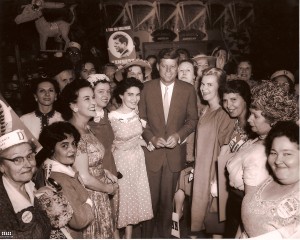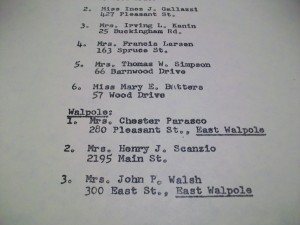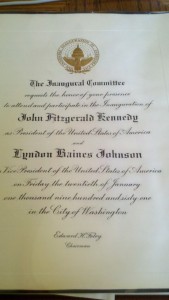Over the course of this semester, one thing that is probably obvious to anyone who had not known me before is how much I truly enjoy every aspect of being a Historian. I have been lucky enough to gain employment in the field, and subsequently receive irreplaceable training and experience by the countless individuals I have encountered across the country in my research endeavors.
The Last American Pirate blog struck a chord with me. I have not read the entirety of the blog (but from your reading reflections thus far, I can gather that it isn’t a result of solid research – something I might have assumed by some grammatical errors in the publications), but from what I read thus far, her efforts remind me of research I have been pursuing for the last few years.
The long of the short is that my great grandmother was a campaign volunteer for the Democratic party in Massachusetts, most actively from the 1950’s to late 1960’s. I have always known that she was politically active from the stories I’ve heard, to the government issued license plate I received as a family heirloom for my first car in high school. The degree of her involvement and achievements were not apparent until I devoted my scholastic and professional life to History a few years ago. Since then, I have received a number of artifacts and heirlooms from this woman who I never had the privilege of meeting. During the years of her involvement, anyone who has even a modest grasp of history is aware that women were not, and were not encouraged to be, politically active. The group she was involved with, the Democratic Women on Wheels was one of the few all-women grass roots movements in this era, especially having any level of success.
I always heard that she was involved with the election of John F. Kennedy, but considering his notoriety in Massachusetts, I wasn’t that impressed (let’s face it, a lot of people might claim to have been ‘a part’ of that election). The first discovery that struck my interest was her in a group photo. There was my relative, not 4 feet away from our 35th President.

From this moment, I began what has been years of research. I’ve spent hours in the archives at the Kennedy Museum and Library in Boston, and much like the author of the ‘Pirate’ blog, my initial trips had been largely unsuccessful.
The issue with grass roots movements is, that they were not well documented. Archivists at the Kennedy Library ask me for information whenever I’m there, because their knowledge is in the larger events and on-goings of JFK’s presidency and life. In that respect, they were not entirely helpful, or optimistic in my endeavors. Reluctantly, the Archivist allowed me to thumb through some Distinguished Women events held by the Kennedy campaign (Distinguished Women events were actually a unique faction within JFK’s election – some events being the infamous ‘Campaign Tea’ events where John would host essentially a town hall meeting with these invited ‘distinguished women’.
After about half a day spent tirelessly going page by page through boxes of material, I told myself I would leave after this next set. When almost all the way through the collection, I hit a gem…

While this find didn’t progress my research at all, it did make me realize something: my efforts were not for nothing. Somewhere in the depths of this archive, or the Walpole Historical Society, or maybe in an attic somewhere, the answers to my questions exist. Persistence is a requirement of all Historians, whether professional or amateur. There is no such thing as an unsuccessful day of research. Even if the answer to your question has not been found, you are either closer to finding it, or gaining further direction on where to move next.
During my last trip to Boston this past spring break, a gift was awaiting me on my aunt’s coffee table. An entire photo album with artifacts that proved my great grandmother’s level of involvement with the Kennedy campaign. I have letters and invitations in sealed envelopes from the U.S. Congress, ‘Honored Guest’ tickets to events (which research has shown were distributed by the Inaugural Committee by invitation only), and other artifacts that I have only seen in the Kennedy Museum at the University of Massachusetts, Boston.

If this post has encouraged any message, I hope that it is to prove that even the slightest of hints, whether it be stories of a politically involved relative, or a pirate with a sandwich named after him, your findings can be well beyond anything that you could have imagined. If something fascinates you, pursue it. Finding that piece of paper with my grandmother’s name on it makes me proud to know that her efforts were rewarded with her name being a part of the permanent record of John F. Kennedy’s election.
The recent find in my aunt’s attic has given me a direction in my research, and the motivation to complete it. The tales of a politically involved great grandmother has grown into a lifetime research project. Whether it results in a publication, or just a nice narrative for future generations in my family, I hope to be able to properly tell the story of a truly fascinating woman.